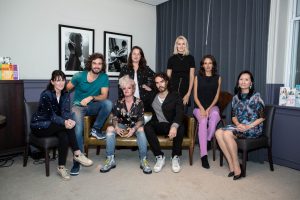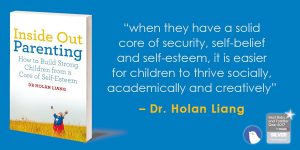Today we have some reflections from Dr Holan Liang, part-time Consultant at Great Ormond Street Hospital and Honorary Senior Clinical Lecturer at UCL, on her journey through academia, motherhood, writing and part-time clinical work in medicine. You can follow her on Twitter on @shrinkgrowskids.
Fifteen years ago, as a junior doctor, I knocked on the door of Thalia Eley’s office. She was then an up-and-coming Senior Lecturer. She shared a tiny office with Jonna Kuntsi, up a pokey stairwell in a converted house next to The Maudsley Hospital. Printed journals, books and papers were stacked everywhere on shelves and desks.
So started my publication journey at what was then the IoP (Institute of Psychiatry). I had published some child psychiatry epidemiology papers from work in South Africa prior to starting psychiatric training at the Maudsley, but this would be my first encounter with behavioural genetics. I didn’t even know that “behavioural genetics” existed then, only that I wanted to be a child psychiatrist and had a vague interest in adolescent depression.
A steep learning curve followed with many sessions at the IoP statistics help-desk, then staffed by Sabine Landau who patiently went through my reams of hopeless STATA queries. Draft paper revisions went back and forth between myself and Thalia with abundant use of track changes. In-between script checking in her office, I heard about her wedding plans and she about my long-distance relationship. Thalia was good at setting deadlines for work, which worked well with my inherent “wish-to-please” personality, meaning that all deadlines were to be met on pain of death. In them days of yore, research involved hand-picking journals from the library or worse, the library stacks and excessive use of the photocopier. Referencing was done by hand-typing all the journal details. Within 6 months a paper was submitted to “the orange journal” with myself as second author. Happy days. A second, on which I was first author, followed not too long after, accepted by Child Development.
Over the next 15 years, Thalia and I took different paths. Following a pragmatic discussion with a senior clinician I changed my clinical interests from depression to neurodevelopmental disorders. The conversation basically involved her enlightening me of the relative stress, risk and sleepless nights involved in being a Consultant in charge of depressed, suicidal and self-harming teenagers, versus looking after hyperactive 7-year olds. As I knew very early on that parenthood was my priority and I wished to protect not only my evening and weekend time but particularly my mental load, neurodevelopmental disorders quickly became my specialty of choice.
I kept in touch with Thalia from time to time. The wedding photos appeared on her desk, followed by news of her babies and in time she also heard of my wedding and babies. I finished my training at the Maudsley and struggled to find a Consultant position which would allow me to work part-time. I talked to Thalia about her reciprocal problems of motherhood and part-time working in academia. We both shared moments when we wondered if it would be expedient to give up. I told her that there was no precedent for Consultants to continue with clinical and research interests on a part-time basis. I remember very clearly her words: “If there isn’t a precedent, it just means YOU must set it.”
At times, her words seemed an impossibility, but other times, they spurred me on. Back then, 7 years ago, I made freedom of information act requests to 3 of the main NHS Trusts in London to request information on the number of Consultant part-time posts across all medical specialties in London that had been advertised over the last year. The discovery that if I wanted to go part-time as a Consultant in London, I could have applied to ONE post in radiology at UCL, was rather shocking. Considering research time within that would have been laughable. Rather than rage against the machine, I took a post outside London that allowed me to work clinically on a part-time basis, but did not have the research and teaching links that I had grown so used to at The Maudsley. It was a tough time of soul-searching and life-re-evaluation, but on hindsight I am incredibly happy that I took the decision that my family came first.
“If there isn’t a precedent, it just means YOU must set it.”
Over that period, my academic brain was feeling neglected and I was looking for something constructive to do with my knowledge. Incensed by the amount of misinformation among parents revealed during school-gate gossip on many things regarding mental health, I decided to start a blog to share my own parenting challenges alongside research and clinical findings regarding mental health. It turns out that writing blogs and writing papers utilize much the same skill set. Searching research databases and presenting a coherent argument are involved in both, only writing for a lay audience is rather more liberating and you can use words like “totes”, “obvs”, “mortificado” rather than “plethora”, “dearth” and “equivocal”. Positive feedback from readers around the world from Brazil to Bahrain led me to tentatively submit collated blog-posts to a few literary agents. After several rejections which were born with the resilience and stoicism of someone that had experience of submitting to ruthless peer review journals and their panels, I finally struck gold and was signed as an author! The book writing process bore similar resemblance to paper writing, with the back and forth of manuscripts and the ever present “track-changes”. In fact editors turned out to be puppy dogs compared to some peer-reviewers that have suggested re-doing entire analyses.
Last year, my first book was published: “Inside Out Parenting” by Bluebird Publishers (see EDITlab review blog here). They also publish Joe Wickes, Russell Brand and even the Pope, so I was in excellent company. Over the last year, it has been great to write for the lay audience, for instance in the Guardian and the Telegraph. I’ve also enjoyed the opportunity to talk about parenting and child mental health to a variety of audiences including embattled mums and dads, CEOs and even the entire global marketing team at Aptamil.
“the skills of understanding science, writing papers and communicating science are highly transferable”
In addition, as my children have gotten older, I have returned to clinical and academic work in London and I am now part-time Consultant at Great Ormond Street Hospital and Honorary Senior Clinical Lecturer at UCL. Better still, it’s been an absolute pleasure to occasionally touch base with my old colleagues at what is now the Institute of Psychiatry, Psychology & Neuroscience (IoPPN) and find that Thalia, Jonna and Sabine are now all Professors. I can’t say that the journey was always easy navigating, motherhood and career ambitions, but what I have learnt is that the skills of understanding science, writing papers and communicating science are highly transferable such that academia and clinical medicine need not be the be-all and end-all. Also, even if it doesn’t feel possible at times, clinical medicine and academia may yet have a change of heart and welcome you back with open arms if you have the tenacity to stay the course. With time, mothers like Thalia and I may get to the tops of our respective career ladders to help other parents, male or female towards a better work-life-mental-health balance.




